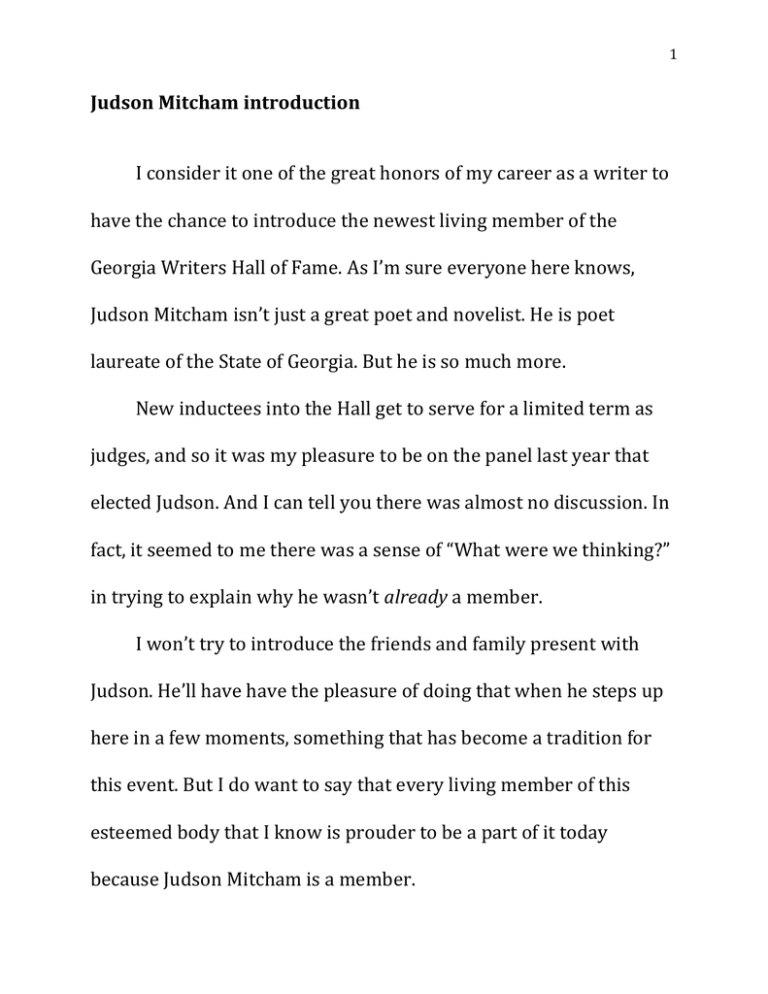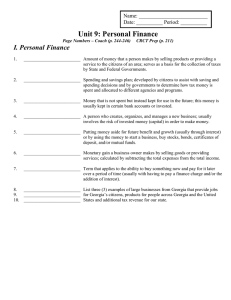Judson Mitcham introduction
advertisement

1 Judson Mitcham introduction I consider it one of the great honors of my career as a writer to have the chance to introduce the newest living member of the Georgia Writers Hall of Fame. As I’m sure everyone here knows, Judson Mitcham isn’t just a great poet and novelist. He is poet laureate of the State of Georgia. But he is so much more. New inductees into the Hall get to serve for a limited term as judges, and so it was my pleasure to be on the panel last year that elected Judson. And I can tell you there was almost no discussion. In fact, it seemed to me there was a sense of “What were we thinking?” in trying to explain why he wasn’t already a member. I won’t try to introduce the friends and family present with Judson. He’ll have have the pleasure of doing that when he steps up here in a few moments, something that has become a tradition for this event. But I do want to say that every living member of this esteemed body that I know is prouder to be a part of it today because Judson Mitcham is a member. 2 I tried to remember the first time I met Judson, and I think it was before 1985, back when we were still young enough to talk about our jump shots and not be lying about it. Judson grew up only a few miles from me in Monroe, and so the lens through which we saw the world must have been very similar. I had heard he was an up and coming poet, and I knew he had published a well-received chapbook called Notes for a Prayer in June in 1986. But it was only when I first read his collection of poems Somewhere in Ecclesiastes, which came out from the University of Missouri Press in 1991, that I realized that Judson Mitcham was already a major figure in Southern letters. How a woman or a man gets to a point of eminence as a creative writer is always something of a mystery. For Judson Mitcham, that story began in Monroe, but it came through Athens, Georgia, as it did for so many others. For he came to this place as a fine student and in almost record time earned undergraduate, master’s, and doctoral degrees in psychology. If anyone was primed 3 for grad school he was, graduating Phi Beta Kappa as an undergraduate in 1969 before earning his other degrees here in 1971 and 1974 respectively. His career track took him on an unusual and pathbreaking journey. In 1974 he became an assistant professor of psychology at historically black Fort Valley State College. He would stay there until 2004, serving as head of his department for an amazing seventeen years in a row. In all his years as a professor, thousands of students had life-changing experiences with a man who is also an exceptional teacher. But literature was never far from his mind as he spent those good years as a professor and as a family man. Along the way, he also taught English and creative writing at Emory University and Georgia College and State University, as well as here at the University of Georgia. Starting in 2002, he became senior lecturer in English at Mercer University in Macon, and last spring he was named the Ferrol A. Sams, Jr., Distinguished Chair of English and Writer-in-Residence there. 4 In 2012 he became poet laureate of the State of Georgia. And just to remind you what an honor this is, Georgia is now number eight in population in the entire United States with around 10 million citizens. And as most of you learned in elementary school, Georgia is physically the largest state east of the Mississippi River. It is an important post, and the state of Georgia is honored by having Judson Mitcham as its poet laureate. In addition to his poetry, which also includes the volumes This April Day and A Little Salvation: Poems Old and New, Judson is also a spectacularly gifted novelist. I remember reading his first novel, The Sweet Everlasting about the time I’d read Somewhere in Ecclesiastes for maybe the third time, and my first reaction was simple: This isn’t fair. It isn’t fair that one person could have this much talent in two different literary fields. Others recognized his excellence, too, since The Sweet Everlasting won the Townsend Prize for Fiction, the most coveted prize for an individual book in Georgia. And when his second novel, Sabbath Creek, came out in 2004, he had to go and do 5 it again. So he is the only two-time winner of the Townsend Prize. But I’m here to tell you something. He got those prizes the oldfashioned way. He earned them. Along the way, he also earned a Pushcart Prize and the Devins Award, and he was named Georgia Author of the Year twice, in Poetry and in Fiction. And he won a National Endowment for the Arts Creative Writing Fellowship, too. He has done readings and workshops in many cities, and his poems have been in numerous textbooks and anthologies. Dozens of Judson Mitcham’s poems also have graced America’s best literary journals over the years, among them the great Georgia Review. And I must point out with a lot of pride that both of Judson’s novels and his latest collection of poetry came out from our own University of Georgia Press. In an interview, Judson said something that gets to the heart of who he is as a writer. He said, “Flannery O’Connor says that the writer can choose to write about anything he likes, but he cannot 6 choose what he makes live. My work is set in the South because that’s what comes alive for me when I try to write.” He has also brought to his art a deep sense of our land’s troubled history but with an abiding sense of compassion for persons, places, and even things. And while psychology might not have directly helped Judson as a poet, literature and psychology both benefitted by that intersection between science and art that he embodies so well. Judson also said something else I love. He said, “Poets are involved with what language can discover. We can bring our experiences and observations and emotions and thoughts to language, which is primary. It’s by attending closely to language that we discover what can be said as poetry.” The beauty and intensity that this man has brought to language have been a permanent gift to all humankind. That is why it is a great honor to introduce Judson Mitcham as a new member of the Georgia Writers Hall of Fame. # 7




